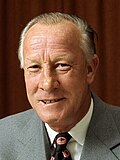Second Whitlam ministry | |
|---|---|
| 48th Ministry of Australia | |
 Governor-General Sir Paul Hasluck with first arrangement of newly appointed ministers to the Second Whitlam ministry | |
| Date formed | 19 December 1972 |
| Date dissolved | 12 June 1974 |
| People and organisations | |
| Monarch | Elizabeth II |
| Governor-General | Sir Paul Hasluck |
| Prime Minister | Gough Whitlam |
| Deputy Prime Minister | Lance Barnard |
| No. of ministers | 27 |
| Member party | Labor |
| Status in legislature | Majority government |
| Opposition party | Liberal |
| Opposition leader | Billy Snedden |
| History | |
| Outgoing election | 18 May 1974 |
| Legislature term | 28th |
| Predecessor | First Whitlam ministry |
| Successor | Third Whitlam ministry |
| ||
|---|---|---|
Member for Werriwa (1952–1978)
Term of government (1972–1975)
Ministries Elections Related | ||
The Second Whitlam ministry (Labor) was the 48th ministry of the Government of Australia. It was led by the country's 21st Prime Minister, Gough Whitlam. The Second Whitlam ministry succeeded the first Whitlam ministry, which dissolved on 19 December 1972 after the final results of the federal election that took place on 2 December became known and the full ministry was able to be sworn in. The ministry was replaced by the Third Whitlam ministry on 12 June 1974 following the 1974 federal election. [1]
Contents
The order of seniority in the second Whitlam ministry was determined by the order in which members were elected to the Ministry by the Caucus on 18 December 1972, except for the four parliamentary leaders, who were elected separately.
As of 21 October 2023, Doug McClelland is the last surviving member of the second Whitlam ministry.



























